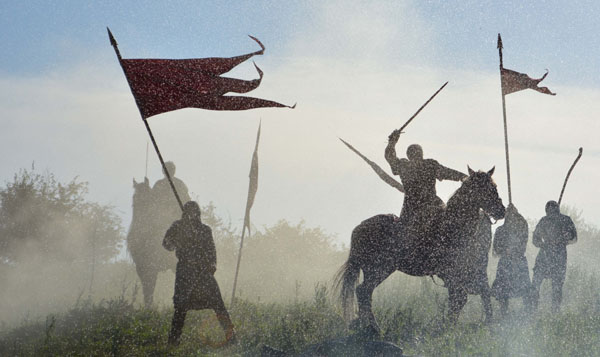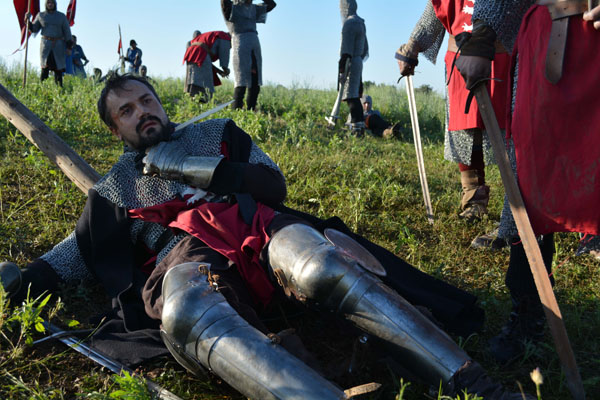Betrayal. Hatred. Revenge. Tyranny. Rulers within the fictional Seven Kingdoms and real-life medieval England have used each as a means or motive to gain or maintain the throne, for the latter as illustrated in the brilliant docudrama, Britain’s Bloodiest Dynasty: The Plantagenets.

Centuries before the power-hungry, bloodthirsty, and ruthless families of Game of Thrones, there were those of the Plantagenet dynasty. Their more than three-century rule of England during the Middle Ages led to the Wars of the Roses, one of the inspirations for GoT‘s (initial) source material, George R.R. Martin’s fantasy novel series A Song of Ice and Fire.
The rises to power, machinations, and comeuppances of four Plantagenet kings — Henry II, Henry III, Edward II, and Richard II — are the stories of Britain’s Bloodiest Dynasty: The Plantagenets, hosted by “hipster historian” Dan Jones, author of the bestseller The Plantagenets and the recently-published The Wars of the Roses. Says Jones about the Plantagenets, their stories are “more shocking, more brutal, and more astonishing than anything you’ll find in fiction.”
Episode 1: “Betrayal”
After the “powerhouse” Henry Plantagenet is crowned King Henry II, the first ruler of the Plantagenet dynasty establishes an empire that “stretches from the borders of Scotland to the Pyrenees.” But his “charismatic kingship” is ultimately second to his nature as a control freak.
One thing that Henry can’t control is the self-governing Church, so when his best mate and Lord Chancellor Thomas Becket is made the Archbishop of Canterbury, he believes Thomas will help him bring the Church “to heel.” He is mistaken. And more betrayals follow.
Blind to his own faults and his family’s feelings, Henry II feeds the fire of resentment in sons Richard and the “ambitious, power-hungry, and impatient” Henry the Young King, as well as his wife, the “serious political player” Eleanor of Aquitaine. Hell hath no fury like a woman scorned (or in this case robbed), so for help in wresting power away from the elder Henry, Eleanor and sons turn to another king: Louis VII of France, Eleanor’s ex-husband and Henry II’s enemy of enemies.
Episode 2: “Hatred”
Henry III, the fourth Plantagenet king, doesn’t have the qualities that make a great king. Neither does he possess many of the lands in France that had been part of the English empire. But then he meets a minor French nobleman and knight, the ambitious Simon de Montfort, and things start looking up. For both of them. Until the best mates become bitter enemies.

Worsening matters is the relationship between Henry and the “dangerous, ruthless, and pretty nasty” Lusignan family of his half-brother William de Valence, not to mention Henry’s flagrant disregard of Magna Carta and his sworn oath to the Provisions of Oxford.
Regardless of how much Henry and Simon hated and fought each other, two things created during Henry III’s reign still stand today: Parliament and the magnificent Westminster Abbey.
Episode 3: “Revenge”
You’d think that Edward II, the sixth Plantagenet king, would have learned from history not to let his feelings for his closest friend impact his judgment. But that’s exactly what happens when he recalls from France his exiled (and arrogant, insufferable, and roundly hated) best mate Piers Gaveston — not just once but twice, enraging his first cousin, the Earl of Lancaster, and nearly everyone else.
Things get worse, and Edward plots revenge against Lancaster with the help of the greedy and ruthless Despensers of Winchester. Injustices done by them against Welsh Marcher Lord Roger Mortimer set him on a course of revenge, too — against the Despensers and the king. And Edward’s humiliated French wife, Queen Isabella, a.k.a. the “She-Wolf of France,” is intent on ridding England of the king/Despenser trio, as well.
If you think you’ve seen gruesome, vicious, and inhuman acts in GoT, the writers could have gotten some of their ideas from Isabella. As Dan Jones sums it up, “Personal murderous vindictiveness has become the defining characteristic of Edward II’s reign.”
Episode 4: “Tyranny”
The final episode centers on the eighth Plantagenet king, Richard II, boy hero of the Peasants’ Revolt. But the reign of terror by “the most vicious Plantagenet of them all” (think GoT‘s Joffrey Baratheon), driven by Richard’s beliefs that God is on his side and he is thus invincible, spells the beginning of the end of the dynasty.
Here again a close friend of the king, in this case the young Earl of Oxford Robert de Vere, plays a role in the monarch’s rule of his empire. Until battle breaks out, de Vere runs for the hills, and Richard is left to face the wrath of those who would have him deposed, including his cousin Henry Bolingbroke. Except Richard remains on the throne, and he takes this as another sign of God’s protecting him.
Richard totally loses it, though, after wife Anne of Bohemia dies, and the façade of a peace-promoting king shatters. Says Dan Jones, “The monster has been unleashed.” While Richard’s revenge on the five key members of his opposition might taste sweet, it doesn’t last.
The stories of these Plantagenet kings are utterly fascinating and gripping, with an authentic feel given more by the use of the French language during most of the reenactments than by the costumes or even the settings.
And what makes Britain’s Bloodiest Dynasty so accessible, even to viewers who don’t typically gravitate toward documentaries, is Dan Jones’ style of storytelling.
Jones doesn’t just narrate; he speaks as though he’s in a conversation with you, albeit it a dramatic one. He peppers throughout the series modern-day terms such as bonkers, going viral, and spanking new, while taking viewers through the “you are there” reenactments at Chinon Castle, Poitiers Cathedral, and the Conciergerie prison in France, as well as Westminster Abbey, Canterbury Cathedral, and the Tower of London in England.
As Mark Twain said, “Truth is stranger than fiction…,” and in the realm of English history, the Baratheons, Lannisters, Starks, Targaryens, et al got nothin’ on the Plantagenets.
Britain’s Bloodiest Dynasty: The Plantagenets is now streaming, exclusively on Acorn TV.
__________________
Add your comments on our Facebook, Google+, and Twitter pages.
Share this post/page.